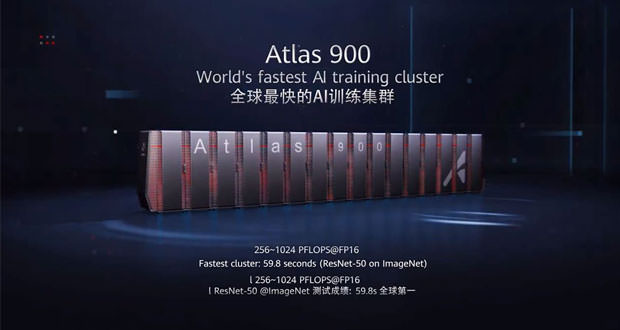Atlas 900: Huawei’s AI training cluster is the fastest in the world
Atlas 900 is an AI self-learning cluster based on Ascend processors and designed for applications such as astronomy, weather forecasting, oil exploration and autonomous driving.
Defining the Atlas 900 as a simple computer would be extremely reductive. Atlas 900 is a cluster consisting of thousands of Ascend 910 processors (Huawei did not specify the exact number). It is equipped with PCI-E 4.0, 100G RoCE interconnections. The company indicates its power in 256–1024 PFLOPS with FP16 calculations, approximately the power of half a million normal desktops.
For cooling, special cabinets capable of dissipating 50 KW each and particular liquid systems are used.
Based on the ResNet-50 Atlas 900 benchmarks, it is the fastest AI computer in the world: the test was completed in 59.8 seconds, making it 15% faster than the second in the rankings.
What is Atlas 900 for?
Atlas 500 is a cluster designed for the training of artificial intelligences, that is, to train AI in relation to the tasks they will have to perform. Among the ideal applications for this type of architecture, Huawei indicates space exploration, the creation of models for weather forecasts, hydrogeological research.
” We are in a new era of exploration ” – said Ken Hu, Chairman of Huawei – ” An ocean of unlimited potential is waiting for us, and today we are launching a thousand ships. We work together, we take this historic opportunity and bring artificial intelligence to new levels “.
Huawei’s strategy for data processing
On the occasion of the Huawei Connect 2019 the company presented its calculation systems strategy which, according to the company, is evolving very rapidly, going beyond the statistical calculations, which will represent only 20% of the calculation tools used in the world: the remaining 80% will be based on AI calculations.
Huawei’s strategy is based on this assumption and focuses on four key points, architecture innovation, investment in different ranges of processors suitable for the various scenarios, keeping the boundaries of the business clear and investing in an ecosystem open.
If the first two points are easily understood, it is worth spending a few words on the remaining ones, in particular on the concept of defining the boundaries of the business activity. Huawei has specified that it does not intend to sell the CPU directly, but will offer them directly as a cloud service or sell them as components to its partners, giving priority to integrated solutions.
Huawei does not intend to shut down its systems, but wants them to be as open as possible and in this regard, it has declared its intention to invest 1.5 billion over the next five years in the program dedicated to developers, so as to give a boost to the development of innovative applications.

